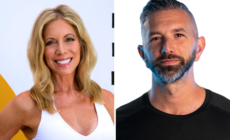-
What Your Xmas Gift Says About Your Marriage, According to Experts - 14 mins ago
-
Year in Review: What Moment Defined 2024? Newsweek Writers’ Verdicts - 49 mins ago
-
Encountering Italy and Germany on a Road Trip Through Southern Brazil - 56 mins ago
-
America’s Most Popular Christmas Movies Revealed - about 1 hour ago
-
How Netflix’s ‘Culinary Class Wars’ Made Chef Anh Sung-jae a Star - 2 hours ago
-
Dodgers Considering Blockbuster Trade For Luis Robert Jr. - 2 hours ago
-
How to Keep ‘People Pleasing” From Ruining Your Finances - 2 hours ago
-
Federal Judge Sets Court Date After NASCAR Appeals 23XI Racing And FRM Lawsuit Milestone - 3 hours ago
-
Inside the Final Days of the Assad Regime in Syria - 3 hours ago
-
College Football Playoff: Texas Eliminates Clemson, Will Play Arizona State in Peach Bowl - 3 hours ago
Health Care Leader Says Medical Systems Are Broken, ‘Not the People Within’
In 2024, experts in almost every industry are having the critical discussion about how to incorporate artificial intelligence (AI) into their work. While the emerging technology presents opportunities to boost efficiency, it can also run the risk of introducing new problems to the workplace.
On Tuesday, September 17, more than 100 people gathered at the Newsweek office at One World Trade Center in New York City to listen to a panel of health care professionals discuss what AI means for physicians and their workload.
This event kicked off Newsweek‘s latest initiative: Newsweek Horizons, a series of panels and speaker events designed bring together new and diverse perspectives to discuss potential solutions for some of the key issues in the future—from health and wellness to climate and sustainability to technology and the workplace.
The panel, moderated by Newsweek‘s Health Care Editor Alexis Kayser, explored the realities of doctor burnout and how health systems can use AI tools to ease the mounting administrative pressures put on health care workers without adding to clinicians’ stress.

Marleen Moise
The expert panelists included Dr. Eric Williamson, the associate chair for radiology informatics and supervision of the Radiology Artificial Intelligence Program at Mayo Clinic; Dr. Ashley Beecy, the medical director of artificial intelligence operations at NewYork-Presbyterian; Dr. Christine Sinsky, the vice president of professional satisfaction at the American Medical Association; and Dr. Pete Clardy, the senior clinical specialist at Google Health.
The four panelists brought their combined decades of experience as physicians, professors and researchers to the stage to talk about the ways that automation technology has evolved within the health care industry, how it can be used to help alleviate physician burnout and the ways AI may even present new problems to an already overwhelmed system.
At 6 p.m., guests from across the health care industry began gathering at Newsweek‘s Manhattan office. Audience members include representatives from Amazon, the American College of Physicians, Johnson & Johnson, Mount Sinai Health System and Pfizer.
Dr. Chris DeRienzo, the chief physician executive of the American Hospital Association, delivered the opening remarks ahead of the panel discussion and laid the foundation for why this conversation is not only timely but necessary. He said the health care industry is facing a “historic” workforce crisis, with clinicians burning out at “alarming rates,” and added that finding solutions to these problems is a top priority for health systems all over the country.

Marleen Moise
Burnout, as defined by the World Health Organization (WHO), is a syndrome “resulting from chronic workplace stress that has not been successfully managed.” People experiencing burnout feel energy depletion or exhaustion, have increased mental detachment, negativity or cynicism related to one’s job and have reduced professional efficacy, according to WHO.
While many people across several industries have experienced burnout, especially since the COVID-19 pandemic, the health care industry was hit particularly hard in recent years. Nearly half of physicians (48.2 percent) reported experiencing at least one symptom of burnout, according to the American Medical Association (AMA). This is, however, the first time that the number has dropped below 50 percent since 2020.
Between 2021 and 2022, more than 71,300 physicians in the U.S.—about 6 percent of the total physician workforce—left their jobs, according to the data analytics firm Definitive Healthcare. That was almost double the rate of before the pandemic.
Panelist Dr. Christine Sinsky said she thinks of burnout as a disconnect between the mission of clinicians’ work and the content of their daily work.
“That feeling that we are spending our days doing the wrong work for our patients, that is really at the heart of burnout,” she said.

Marleen Moise
Sinsky added that many physicians often reject or dismiss the term “burnout” out of fear of judgement that the term puts “the locus of responsibility on the individuals.”
“And my response to that is, while burnout manifests in the individuals, it originates in the systems,” she said. “And it is the systems that are broken, not the people within.”
Recently, AI has emerged as a potential solution to many of the problems that facing the health care industry. According to McKinsey & Company, generative AI technology is anticipated to automate some of the more tedious and mundane administrative tasks.
At NewYork-Presbyterian, Dr. Ashley Beecy partners with clinical, administrative and research leaders to drive data and AI strategy. She told the audience that the physicians adopting AI for administrative reasons report working more efficiently even though the task took roughly the same time.
“I think that really demonstrates the reduction in mental fatigue due to changing a task from writing and having the inertia to start it to now [being] an editing task,” she said. “We may need to look at metrics outside of productivity, such as cognitive burden and other things that show value.”

Marleen Moise
Dr. Eric Williamson said he’s seen similar results at Mayo Clinic, where radiologists have been able to automate or semi-automate the generative tasks when analyzing images and move into editing functions.
He said that while the perception of reduction in cognitive load often exceeds the actual reduction in cognitive load, reducing the perceived meaninglessness of a clerical task makes doctors feel they are doing more “high value” tasks.
While some people in health care are excited about the potential for more efficiency in the industry, others are concerned that the new technology could present unforeseen challenges that could exacerbate some existing issues.
Newsweek‘s Kayser asked the panelists how health systems can use AI to save time without increasing doctors’ workloads.
Improved efficiency could give time back to physicians, which, theoretically, could allow them to work fewer hours, Kayser said. However, the time saved on administrative work could be filled with more patient visits, added to doctors’ caseloads and accelerating burnout.
Sinsky said most physicians can save three to five hours a day before adding in AI efficiencies by “re-engineering the way the work is done and by more strategically delegating that work to an upskill staff.”
One way she suggests utilizing those hours is by dividing them across patient care, organizational management and the physician’s personal life.
“There’s so much opportunity to use that save time,” she said. “Some of it can be to increase access to the people in your community who are currently not able to access care, some of it has to be to make the system work better and some of it has to care for the people caring for the patients.”
When the time saved means the difference between looking at a screen and looking at another person, Dr. Pete Clardy of Google Health said it is important to be clear about the problem that needs to be solved and what the tools can and can’t do.

Marleen Moise
“The goals really would be tools that help simplify and flatten some of the complexity of what is increasingly this huge set of data surrounding every person and find ways to leverage those tools to see more of the patient in front of you,” he said.
The panel discussion concluded with a lively Q&A session with audience members followed by a cocktail reception, where guests and panelists continued the discussion over drinks and hors d’oeuvres.
The next Newsweek Horizons event will take place on Wednesday, September 25. Five panelists will join Newsweek’s Environmental Sustainability and Governance Editor Jeff Young to discuss how technology and energy companies can balance the climate benefits of AI with the emerging technology’s high-power energy demands amid the clean energy transition.
Source link






















